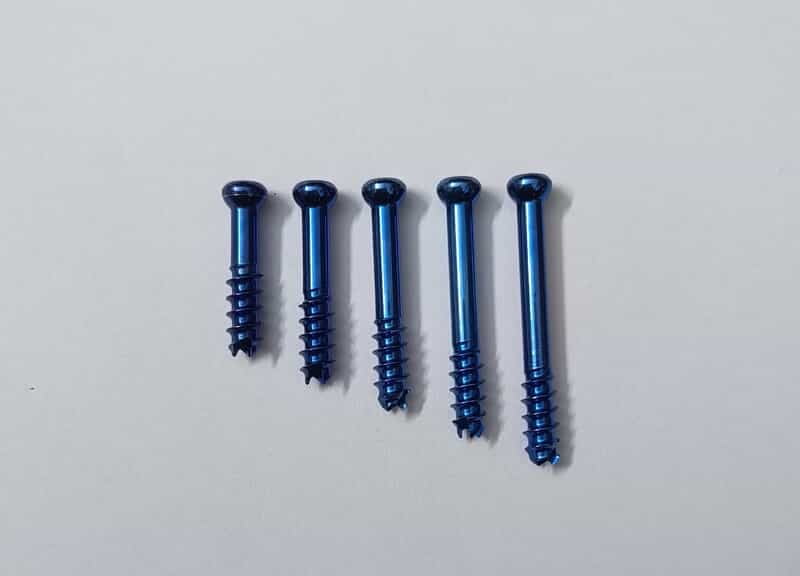
































6.5 MM CANNULATED SCREW SELF DRILLING
Product Details
Product Details:
The 6.5 MM Cannulated Screw Self-Drilling Titanium is designed for optimal orthopedic fixation, particularly in cancellous bone. Available with 16 MM and 32 MM thread lengths, this screw provides tailored solutions for varying surgical needs. The cannulated design allows for guided placement over a wire, and the self-drilling feature reduces the need for pre-drilling, streamlining the surgical procedure. Made from high-quality titanium, it offers both strength and biocompatibility.
The 6.5 MM Cannulated Screw Self-Drilling Titanium is designed for optimal orthopedic fixation, particularly in cancellous bone. Available with 16 MM and 32 MM thread lengths, this screw provides tailored solutions for varying surgical needs. The cannulated design allows for guided placement over a wire, and the self-drilling feature reduces the need for pre-drilling, streamlining the surgical procedure. Made from high-quality titanium, it offers both strength and biocompatibility.
Key Features:
- Cannulated Design: Facilitates precise guided insertion over a wire, allowing for more accurate screw placement.
- Advantage: Improves accuracy during complex procedures.
- Disadvantage: Requires specific instrumentation (guide wire) for insertion.
- Self-Drilling Capability: Reduces the need for pre-drilling, saving time during surgery.
- Advantage: Simplifies the procedure and reduces surgical time.
- Disadvantage: May require careful placement to avoid stripping bone during insertion.
- Multiple Thread Length Options: Available in 16 MM and 32 MM threads for varying bone thickness and fracture types.
- Advantage: Offers versatility based on bone quality and anatomy.
- Disadvantage: Surgeons need to select the correct thread length for the specific case.
- Titanium Construction: Ensures durability, biocompatibility, and resistance to corrosion.
- Advantage: Reduces the risk of allergic reactions and implant degradation.
- Disadvantage: More expensive than other materials like stainless steel.
- Designed for Cancellous Bone: Ideal for trauma and fracture fixation in soft, cancellous bone.
- Advantage: Provides superior engagement in softer bone.
- Disadvantage: May not be ideal for denser cortical bone.
- Cannulated Design: Facilitates precise guided insertion over a wire, allowing for more accurate screw placement.
- Advantage: Improves accuracy during complex procedures.
- Disadvantage: Requires specific instrumentation (guide wire) for insertion.
- Self-Drilling Capability: Reduces the need for pre-drilling, saving time during surgery.
- Advantage: Simplifies the procedure and reduces surgical time.
- Disadvantage: May require careful placement to avoid stripping bone during insertion.
- Multiple Thread Length Options: Available in 16 MM and 32 MM threads for varying bone thickness and fracture types.
- Advantage: Offers versatility based on bone quality and anatomy.
- Disadvantage: Surgeons need to select the correct thread length for the specific case.
- Titanium Construction: Ensures durability, biocompatibility, and resistance to corrosion.
- Advantage: Reduces the risk of allergic reactions and implant degradation.
- Disadvantage: More expensive than other materials like stainless steel.
- Designed for Cancellous Bone: Ideal for trauma and fracture fixation in soft, cancellous bone.
- Advantage: Provides superior engagement in softer bone.
- Disadvantage: May not be ideal for denser cortical bone.
Benefits:
- Enhanced Surgical Efficiency: The self-drilling design reduces pre-operative steps, speeding up procedures.
- Advantage: Time-saving in the operating room.
- Disadvantage: Surgeons must be careful to avoid bone over-compression.
- Precision and Stability: The cannulated design ensures precise screw placement, improving surgical outcomes.
- Advantage: More accurate placement reduces post-operative complications.
- Disadvantage: Dependence on guide wire accuracy.
- Biocompatibility: Titanium minimizes the risk of allergic reactions and ensures a long-lasting implant.
- Advantage: Ideal for patients with sensitivities to metals.
- Disadvantage: Higher cost compared to stainless steel screws.
- Versatile Application: Suitable for various types of fractures and orthopedic trauma surgeries.
- Advantage: Adaptable to a wide range of surgical needs.
- Disadvantage: Requires careful assessment to select the appropriate thread length for each case.
Ordering Information:
- For detailed product codes, ordering information, and to find out more about how the Meril 6.5 MM Cannulated Screw Self-Drilling Titanium can be integrated into your surgical practice, visit our website or contact a Meril representative
- Enhanced Surgical Efficiency: The self-drilling design reduces pre-operative steps, speeding up procedures.
- Advantage: Time-saving in the operating room.
- Disadvantage: Surgeons must be careful to avoid bone over-compression.
- Precision and Stability: The cannulated design ensures precise screw placement, improving surgical outcomes.
- Advantage: More accurate placement reduces post-operative complications.
- Disadvantage: Dependence on guide wire accuracy.
- Biocompatibility: Titanium minimizes the risk of allergic reactions and ensures a long-lasting implant.
- Advantage: Ideal for patients with sensitivities to metals.
- Disadvantage: Higher cost compared to stainless steel screws.
- Versatile Application: Suitable for various types of fractures and orthopedic trauma surgeries.
- Advantage: Adaptable to a wide range of surgical needs.
- Disadvantage: Requires careful assessment to select the appropriate thread length for each case.
- For detailed product codes, ordering information, and to find out more about how the Meril 6.5 MM Cannulated Screw Self-Drilling Titanium can be integrated into your surgical practice, visit our website or contact a Meril representative






